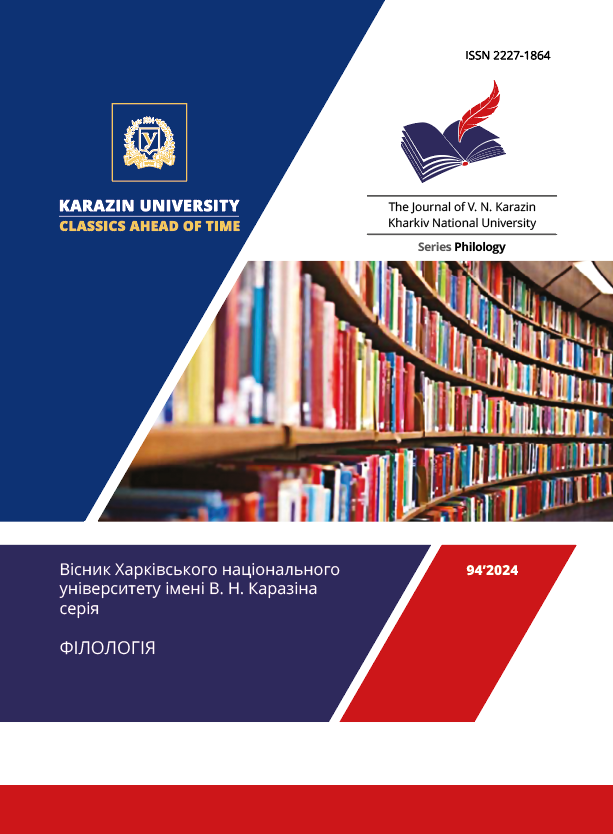Specifics of the Autobiographical Narrative in “Memoirs” of D. Ovsyaniko-Kulikovskiy
Abstract
The article examines the memoir-autobiographical prose of D. Ovsyaniko-Kulikovskiy as an original example of nonfiction literature. The relevance of the work is due to the active study of the theory and history of memoir-biographical prose in domestic and foreign literary studies, as well as the intensive development of contemporary autobiography. The purpose of the study is to identify the specifics of the autobiographical narrative, the peculiarities of the author's self-identification and the construction of the narrator's life story. It is shown that an autobiographical narrative is constructed as a story for others and a story for oneself. Autobiographical memory contains elements of varying degrees of generalization. While maintaining psychophysical identity, the distance between the autocharacter and the narrator is constantly emphasized.
As the narrative develops, the narrator's features of a scientist become more and more pronounced, and the narrative shows signs of scientific discourse. "Memoirs" reveals such components of a scientific narrative as description, explanation, analogy, analysis, argumentation, categorization, classification, logical proof, and intertextuality. The supertask performed by the narrator is to characterize the history of his personal and scientific formation as a path to the acquisition of scientific truths and the methodological, basic, and ideological foundations of scientific activity. The narrative also has elements of artistry: complication of the narrative structure, violation of linearity, fictionalization of biographical stories, expressiveness and integrity of images, attention to detail, etc.
“Memoirs” by D. Ovsyaniko-Kulikovskiy are a memoir-autobiographical conceptualized narrative subordinated to the author's targeted message. This story combines the features of documentary, scientific and fictional narrative and reveals the author's worldview and scientific credo. At the same time, the inner (perhaps subconscious) core of “Memoirs” actually becomes the process of autocreation of an ideal scientist, which becomes a source of inner satisfaction.
Downloads
References
Bakhtin, M. M. (1975). Questions of literature and aesthetics. Research from different years. Moscow: Khudozh. lit., 1975. 504 p. [in Russian].
Votkanych, M. (2020). Autobiographical narrative as a form of manifestation of authorial consciousness in the prose of Mykhailo Hafia Traista. Dialogue of languages – dialogue of cultures: Ukraine and the world: XI International Scientific Internet Conference on Ukrainian Studies (October 29 – November 01, 2020). Munchen,. 246–253. [in Ukrainian]
Halych, А. (2017). Portrait in the Memoirs and Biographical Discourse: semantic, structure, modification. Starobilsk. 449 p. [in Ukrainian]
Genette, J. (1998). Narrative discourse. Genette J. Figures: [in 2 volumes]. T. 2. Moscow: Sabashnikov Publishing House, 60–280. [in Russian]
Kachak, T. (2021). Artistic representation of autobiographical memory in modern Ukrainian prose. Slavica Wratislaviensia. Wielkie tematy kultury w literaturach słowiańskich. T. 173. Wrocław, 278–286. DOI: 10.19195/0137-1150.173.23 [in Ukrainian]
Lotman Yu. М. (2000). Autocommunication: “I” and “Other” as addressees (On two models of communication in the cultural system). Lotman Yu. M. Semiosphere. St. Petersburg: Art-SPB, 163–177. [in Russian]
Maslyuchenko, G. O. (2004). Artistic memoirs and autobiographical novel in Ukrainian literature of the 90s of the 20th century: Abstract ... Candidate of Philology Science. Dnipropetrovsk. 20 p. [in Ukrainian]
Matsevko-Bekerska, L.V. (2020). Cognitive markers of artistic narrative. Language and culture. No. 22 (202), 148–156. [in Ukrainian]
Matsevko-Bekerska, L. V. (2008). Ukrainian small prose of the end of the 19th - beginning of the 20th centuries. in the mirror of narratology. Lviv: Spline. 334 p. [in Ukrainian]
Mykhida, S.P. (2013). Reconstruction of psychological portraits of Ukrainian writers of the late 19 – early 20th centuries based on megatext: Abstract ... Dr. of Philology Science. Kyiv. 40 p. [in Ukrainian]
Ovsyaniko-Kulikovsky, D.N. (1989). Literary and critical works: in 2 vol. / comp., notes, prepared. text by I. Mikhailov. T. 2: From “The History of the Russian Intelligentsia.” Memories. Moscow: Khudozh. lit. 526 p. [in Russian].
Papusha, I. V. (2013). Modus ponens. Essays on narratology. Ternopil: "Krok" Publishing House. 259 p. [in Ukrainian]
Reznichenko, Yu. О. (2020). The concept of a narrative model in modern Ukrainian literary studies. Dyvoslovo. 2020. No. 1 (754), 34–39. [in Ukrainian]
Riker, P. (2000). Time and story. T. 1. Moscow; St. Petersburg: University Book. 224 p. [in Russian].
Tyupa, V. I. (2021). Axial narratological category in historical perspective. Studia Litterarum, T. 6, No. 10, 10–31. DOI: 10.22455/2500-4247-2021-6-1-10-31 [in Russian]
Cherkashina, T. Yu. (2015). Ukrainian memoir-autobiographical prose of the 20th century: genre, structural and ideological-artistic evolution: Abstract ... Dr. of Philology Science. Kyiv. 40 p. [in Ukrainian]
Schmid, V. (2003). Narratology. Moscow: Languages of Slavic Culture. 312 p. [in Russian]
Yavorska, O. (2015). The subject of memory and its narrative strategies in memoir. Problems of Humanities. Series “Philology”. Issue 36, 213–221. URL: http://nbuv.gov.ua/UJRN/Pgn_fl_2015_36_22 (date of application: 11.03.2024) [in Ukrainian]
Smith, S., Watson, J. (2001). Reading Autobiography. A Guide for Interpreting Life Narratives. London; Minneapolis: University of Minnesota Press. 296 p. [in English]
Brockmeier, J., Carbaugh, D. (eds.) (2001). Narrative and Identity. Studies in Autobiography, Self and Culture. Amsterdam; Philadelphia: John Benjamins Publishing Company. 314 p. [in English]




